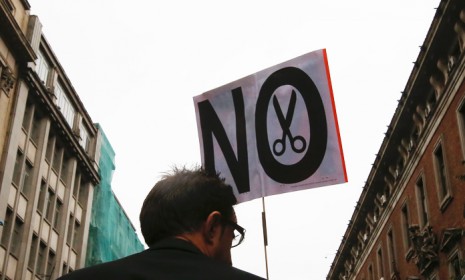Can Spain survive tough new austerity measures?
Spain is proceeding with painful spending cuts and tax hikes that could deepen the country's economic woes — but may be necessary to score loans from Europe

A free daily email with the biggest news stories of the day – and the best features from TheWeek.com
You are now subscribed
Your newsletter sign-up was successful
This week, the government of Spanish Prime Minister Mariano Rajoy unveiled a slate of tough new austerity measures that are intended to reduce the government's budget deficit by $84 billion over the next two and a half years. Rajoy's proposal is likely to pass given his party's control of parliament, but that didn't stop tens of thousands of protesters across the country from rioting and clashing with police. Another escalating factor: The leader of Catalonia, a region with a historically tense relationship with the central government, said he may allow Catalans to vote on secession. Analysts say the austerity measures are part of a strategy to secure badly needed loans from the European Central Bank (ECB), but they're guaranteed to usher in a whole new world of pain for Spain's workers, a quarter of whom are already unemployed. Can Spain survive more austerity?
No. Europe has to end its austerity fixation: The Spanish public is, "in effect, saying that it has reached its limit," says Paul Krugman at The New York Times. "With unemployment at Great Depression levels and with erstwhile middle-class workers reduced to picking through garbage in search of food, austerity has already gone too far." The maddening part is that "more austerity serves no useful purpose," merely prolonging recessions that only exacerbate yawning budget deficits. The ECB must shore up Spain's finances — "and it should do so without demanding more pointless pain."
The Week
Escape your echo chamber. Get the facts behind the news, plus analysis from multiple perspectives.

Sign up for The Week's Free Newsletters
From our morning news briefing to a weekly Good News Newsletter, get the best of The Week delivered directly to your inbox.
From our morning news briefing to a weekly Good News Newsletter, get the best of The Week delivered directly to your inbox.
Yes. Austerity is the only way forward: The only way the ECB can intervene is if its loans come "with many strings attached, including stern austerity measures," says James Ashton at the London Evening Standard. Otherwise you can expect "howls of protest from the Germans, who feel they are being forced to underwrite other countries' mistakes." It's true that Europe could set debt-reduction targets "at more achievable levels" to prevent unnecessary pain and ease doubts that Spain can actually come through on its promises. But overall, "such desperately needed short-term actions pave the way to a longer-term solution to this crisis."
"Spain's fate is key to the eurozone"
Rajoy can't win either way: "Spain has entered into a permanent crisis," says Alen Mattich at The Wall Street Journal. The bond market and the ECB are only too happy seeing "Spaniards protesting on the streets," because it means the government is serious about austerity. So Rajoy's government must try to "keep people protesting austerity without actually causing the country to go into meltdown." It's inevitable that Rajoy "will get the balance wrong" — and that could mean disaster not just for Spain, but for Europe.
"Europe's never-ending crisis"
A free daily email with the biggest news stories of the day – and the best features from TheWeek.com
-
 Quiz of The Week: 14 – 20 February
Quiz of The Week: 14 – 20 FebruaryQuiz Have you been paying attention to The Week’s news?
-
 The Week Unwrapped: Do the Freemasons have too much sway in the police force?
The Week Unwrapped: Do the Freemasons have too much sway in the police force?Podcast Plus, what does the growing popularity of prediction markets mean for the future? And why are UK film and TV workers struggling?
-
 Properties of the week: pretty thatched cottages
Properties of the week: pretty thatched cottagesThe Week Recommends Featuring homes in West Sussex, Dorset and Suffolk